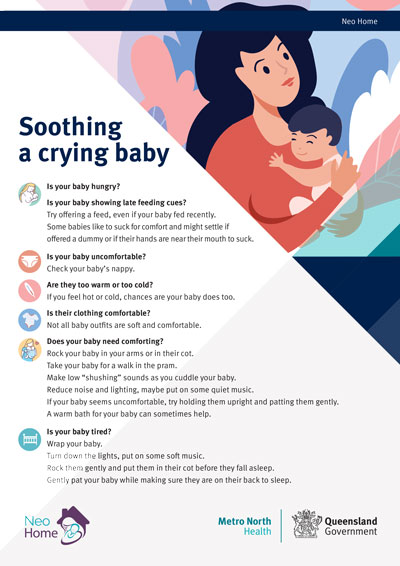Soothing and Sleeping
There are many ways to sooth your baby and to assist with baby sleep. Responding to your baby with love, warmth and gentleness allows your baby to feel secure and safe. It is important to remember that you can’t spoil your baby. It is also important to acknowledge that sometimes, it can be hard to settle a baby. Sometimes that can lead to feeling frustrated and angry. If you are feeling this way, then you need to put your baby down in their cot and ask someone to help you if they are available. If there is no-one immediately available, take some time out until you feel more able to try soothing your baby again.
Newborns connecting & communicating | Raising Children Network
Physical contact and touch help to build connection with your baby. The following information might help with soothing and supporting baby sleep
Crying
You may find that as your baby gets closer in age to the date they were due to be born, they may have longer periods of crying or unsettled behaviour. This can be normal behaviour. Crying is your baby’s main form of communication and is their way of “talking” to you. Your baby will cry when they are hungry, tired, uncomfortable, or sick. Sometimes, they cry because they need comforting such as a cuddle or some other form of touch like patting or stroking their head. On average, babies cry for almost three hours per day. They may cry more in the late afternoon or early evening. You may have heard of the term “the witching hour”. Some parents use this term to describe the time in the late afternoon when their baby is the most unsettled.
As your baby gets older and passes their “due date”, you should consider introducing a “feed, sleep and play” routine
Useful resources
www.raisingchildren.net.au/newborns/sleep/settling-routines/newborn-sleep-routines
Sleeping
Newborn and premature babies sleep, on average between 14 and 17 hours each day. In the hospital, they may sleep up to 22 hours each day. They sleep in 2 to 3 hours blocks of time and wake frequently for feeds. This includes waking overnight. Newborn and premature babies do not know the difference between day and night, and it may take some time for them to learn the difference. Here are some things that you can do to help with sleep –
- Try wrapping your baby when preparing them for sleep
- Gently rock them and then put them in their cot just before they fall asleep
- Pat them gently when they are in the cot and then make sure they are on their back when they are asleep.
- At night, try to keep the feeding and nappy changing routine quiet and as quick as possible. Don’t turn on bright lights, keep noise to a minimum. This might help your baby (and you!) transition back to sleep as soon as possible.
- Try not to listen to other parents who say that their baby is sleeping through the night. Most babies don’t start to sleep through the night until they are between 4 and 6 months of age. For some premature babies, it can be between 6 and 8 months of age.
- Premature babies are at an increased risk of Sudden Infant Death Syndrome (SIDS) so it is very important that you follow safe sleeping advice and put your baby down to sleep on their back. Your baby may have slept in different positions in hospital, but they were closely monitored the entire time. Once you are at home, the safest way for your baby to sleep is on their back in their cot.
- Some parents might like to use a sling for their baby. If you put your baby in a sling, remember these five key points
- Tight – make sure you tighten the sling to support your baby’s posture
- In view – make sure you can see your baby’s face
- Close enough to kiss – make sure your baby is close enough to kiss their face
- Keep their chin off their chest – this will keep their airway clear
- Supported back – make sure the sling supports their back
(“Safer sleep advice for premature and low birth weight babies – The Lullaby Trust, UK)
Useful Resources
Contact us
Location: Level 5, Ned Hanlon Building
Phone: (07) 3646 8918
Email: Neoadmin-Nursing-Support
Visiting hours: 24/7 (Quiet time 1.30pm-3.30pm)
Need help outside hours?
Intensive Care Nursery
Phone: (07) 3646 7946
Special Care Nursery
Phone: (07) 3646 7834

